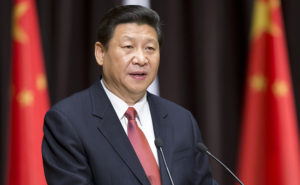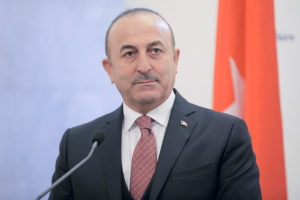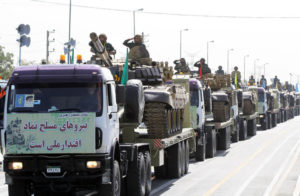Move Made to Quash Regime’s Revenue
“Iran’s leaders plunder the nation’s resources to enrich themselves and to spread mayhem across the Middle East and far beyond,” declared President Trump in a statement to the media on Monday. To this end, the president outlined his strategy for cutting off Iran’s oil exports completely, thus denying the rogue regime its principal source of revenue. As such, the Trump administration announced that they would not renew waivers next month to five countries that continue to import oil from Iran. The official name of the waivers is known as Significant Reduction Exceptions (SREs) and the precise deadline is May 2.

The five nations in question are China, India, Japan, South Korea and Turkey. Voicing their strident opposition to this move, China, who is one of Iran’s largest oil customers, said that the Trump announcement was evidence of US “unilateral sanctions and long-arm jurisdiction.” China, which relies on imports for about half of its oil, could present the toughest diplomatic challenge for the US in trying to enforce its sanctions, as was reported in a Times of Israel report.
CNN reported that Turkey’s Foreign Minister Mevlut Cavusoglu firmly rejected the Trump administration decision on Monday, saying via Twitter that “the US decision to end sanctions waivers on Iran oil imports will not serve regional peace and stability yet will harm Iranian people. Turkey rejects unilateral sanctions and impositions on how to conduct relations with neighbors.”

He went further during a press conference in Ankara, saying that “pushing buying oil from countries besides Iran goes too far. Turkey is against those steps and impositions,” according to the state-run Anadolu news agency.
It was also reported by CNN that a senior Iraqi official said Monday that Trump’s decision to end waivers for the purchase of Iranian oil exports, and pressure Iraq to end its purchase of Iranian power is a “serious problem.”
“Iraq needs good relations with Iran. The US has one policy focus, which is to bring Iran down and are looking through this prism. The situation is precarious. The Americans need a nuanced policy. This drive by the White House risks disrupting Iraq. If they really want a policy towards Iran, they should look at strengthening Iraq. But given that much of our assets are in the Federal Reserve the Americans can make life very difficult for us.”
According to the Trump statement issued by his press secretary Sarah Sanders, the United States, Saudi Arabia, and the United Arab Emirates, three of the world’s great energy producers, are working to ensure global oil markets remain well supplied. The statement went on to say that the United States and its partners will take immediate action to ensure that supplies are made available to replace all Iranian oil removed from the market. The White House added that forecasters expect global oil supply will keep pace with demand in 2019.
Emphasizing that the decision against the renewal of waivers on the purchase of Iranian oil was to show the world that the administration is determined to expand and enforce its maximum pressure campaign against the Iranian regime, the White House statement said that this action was taken to hold Iran accountable for the full range of its malign activities.
“The United States will continue to apply maximum pressure on the Iranian regime until its leaders change their destructive behavior, “ said the White House statement.
Soon after President Trump took office, he fulfilled his campaign pledge to withdrew the United States from the “horrible Iran nuclear deal” and thusly imposed the most stringent sanctions ever placed on the Islamic Republic of Iran. Moreover, the Trump administration declared that all sanctions that were originally lifted under the Obama era Iran deal were reimposed last year. These sanctions targeted critical sectors of Iran’s economy, including energy, shipping, and its financial institutions.

In addition, the Trump administration recently designated Iran’s Islamic Revolutionary Guard Corps (IRGC) as a Foreign Terrorist Organization, putting the private sector on notice not to conduct business with them. As a result of the administration’s actions, Iran’s currency has lost more than two-thirds of its value on the black market. Foreign direct investment and business activity in Iran have fallen off as the private sector is keenly cognizant of the multifarious risks involved when conducting business with Iran.
As a result, the White House reported that more than 100 companies who had previously engaged in business dealings with Iran have ceased and desisted from conducting business there.
The White House also noted that the decision to apply this kind of economic pressure on rogue nation was sending a clear and unambiguous message to the authoritarian regime that its destabilizing activities and global terrorist campaign have serious consequences.
The well-crafted statement also made it known that the malevolent Iranian regime has long used oil revenues to support its destabilizing activities and fund terrorist proxies throughout the world. It is internationally known that Iran is the leading state sponsor of terrorism, with a chief objective of working towards financing and supporting terrorist organizations including al-Qa’ida, Hizballah, Hamas, the Taliban, and others of that ilk.
The Trump administration also called out Iran in terms of their purported promises to scale down and eventually eliminate their entire nuclear program. The statement noted that fact that Iran’s oil revenues have helped to finance their nuclear weapons and ballistic missile programs that threaten the region and the United States.
Without mentioning specific names, the White House statement said that leaders of the Iranian regime have committed horrific human rights violations while using oil revenues to line their own pockets instead of giving support to their own people. It continued by declaring unequivocally that Iran continues to undermine the stability of the region, including through hostility toward Israel and threatening freedom of navigation in the critical Persian Gulf.
Speaking of Israel, the recently re-elected prime minister of the Jewish state, Benjamin Netanyahu lauded the Trump administration’s Monday announcement that it will no longer grant exemptions from sanctions to Iran’s oil customers, according to a TOI report.
“The decision of President Trump and the American administration is of great importance for increasing the pressure on the Iranian terror regime,” Netanyahu’s office said in a statement. “We stand by the determination of the United States against Iranian aggression and this is the right way to stop it.”
Netanyahu was a main voice against the 2015 nuclear deal that opened up Iran’s export market, and has praised Trump’s moves to reverse the pact.
Following the U.S. designation of the IRGC as a terrorist entity on April 8, some have assessed that Iran is likely to intensify proxy attacks on Israel from Syria and Gaza in response, according to an article on the JNS.org web site.
In the Gaza Strip, Palestinian Islamic Jihad (PIJ), the second-largest armed faction in Gaza and Iran’s direct proxy, has grown an arsenal of rockets that now surpasses that of Hamas, the largest terrorist faction in the Strip.
The JNS report indicated that PIJ has been rebuilding its firepower since the 2014 conflict it and Hamas fought with Israel. Today. PIJ and Hamas have a combined rocket arsenal of more than 20,000 projectiles, some of which have a sufficient range of reaching targets north of Tel Aviv, as demonstrated by a March rocket strike on an Israeli home that injured seven civilians.
PIJ’s fighting force of 10,000 armed operatives, combined with Hamas’s 30,000 armed-wing members, mean that Gaza has developed a terrorist army. Together, these Iranian-funded factions threaten to indiscriminately fire rockets at Israeli civilian neighborhoods.
The report went on to say that the administration granted eight oil sanctions waivers when it re-imposed sanctions on Iran after Trump pulled the US out of the 2015 nuclear deal. They were granted in part to give those countries — Japan, South Korea, Turkey, China, India, Greece, Italy, Taiwan — more time to find alternate energy sources but also to prevent a shock to global oil markets from the sudden removal of Iranian crude.
Since November, three of the eight countries — Italy, Greece and Taiwan — have stopped importing oil from Iran. The other five, however, have not, and have lobbied for their waivers to be extended.
Speaking Monday at a press conference, as was reported by CNN, Secretary of State Mike Pompeo said “the goal remains simple: to deprive the outlaw regime of the funds it had used to destabilize the Middle East for four decades and incentivize Iran to behave like a normal country.”
Noting that oil is “the regime’s No. 1 source of cash,” Pompeo said that prior to the implementation of US sanctions, Iran was generating “as much as $50 billion annually,” from oil exports, but that the department estimates the sanctions have “denied the regime well north of $10 billion.”
“How long we remain there — at zero — depends solely on the Islamic Republic (of) Iran’s senior leaders,” he added.
“We have made our demands very clear to the ayatollah and his cronies: end your pursuit of nuclear weapons, stop testing and proliferating ballistic missiles, stop sponsoring and committing terrorism, halt the arbitrary detention of US citizens. Our pressure is aimed at ending these and others and it will continue to accelerate until Iran is willing to address them at the negotiating table,” Pompeo said.
CNN reported that after the announcement from the US, Saudi Arabia’s Oil Minister Khalid al-Falih said the country will coordinate with other oil producers “to ensure the availability of enough oil supplies for consumers and to ensure global oil markets are not knocked off balance.”
The US will also aid the dearth in supply, Pompeo said. The US produced 1.6 million more barrels of oil in 2018 than in 2017, and is on track to increase production in 2019 as well.
But given the ongoing crises in both Venezuela and Libya, which are two major oil supplying countries, there are fears that the US decision will make the oil market more unstable.




